-
 Bitcoin
Bitcoin $83,693.1345
-0.85% -
 Ethereum
Ethereum $2,211.1353
-4.59% -
 Tether USDt
Tether USDt $0.9998
0.10% -
 XRP
XRP $2.1321
-3.02% -
 BNB
BNB $586.8809
-3.22% -
 Solana
Solana $144.2460
4.13% -
 USDC
USDC $0.9998
0.02% -
 Dogecoin
Dogecoin $0.1986
-4.86% -
 Cardano
Cardano $0.6279
-3.91% -
 TRON
TRON $0.2294
0.64% -
 Litecoin
Litecoin $124.7281
-1.24% -
 Chainlink
Chainlink $14.5750
-4.57% -
 Avalanche
Avalanche $21.8396
-2.86% -
 Hedera
Hedera $0.2072
4.22% -
 Stellar
Stellar $0.2818
-1.36% -
 Sui
Sui $2.7928
-1.28% -
 UNUS SED LEO
UNUS SED LEO $9.2263
0.80% -
 Toncoin
Toncoin $3.3254
-1.83% -
 Shiba Inu
Shiba Inu $0.0...01377
-5.25% -
 Polkadot
Polkadot $4.6828
-5.96% -
 MANTRA
MANTRA $7.4674
0.32% -
 Hyperliquid
Hyperliquid $19.2164
-4.35% -
 Bitcoin Cash
Bitcoin Cash $310.0691
4.00% -
 Ethena USDe
Ethena USDe $0.9989
-0.06% -
 Dai
Dai $0.9999
0.03% -
 Bitget Token
Bitget Token $3.9662
-3.76% -
 Uniswap
Uniswap $7.3865
-7.93% -
 Monero
Monero $210.4290
0.30% -
 Aptos
Aptos $6.3364
2.39% -
 NEAR Protocol
NEAR Protocol $3.0362
-1.79%
What is the issuance and circulation of replacement coins?
The issuance and circulation of replacement coins involve technical investigations, legal approvals, exchange listings, and independent audits to ensure transparency and accountability in compensating for lost or stolen cryptocurrencies.
Jan 03, 2025 at 12:16 pm

Key Points:
- Replacement coins are digital assets issued to compensate for lost or stolen cryptocurrencies.
- Issuance of replacement coins involves technical and legal aspects, following strict protocols.
- Circulation of replacement coins is governed by regulations and exchange policies, ensuring transparency and accountability.
- The replacement process considers factors such as proof of ownership, timestamps, and technical feasibility.
- Third-party auditors play a crucial role in verifying claims and facilitating communication between issuers and claimants.
Issuance of Replacement Coins
- Verification of Ownership: Proof of ownership requires evidence demonstrating the individual's control over the lost or stolen cryptocurrency, typically through private keys or wallet addresses.
- Technical Examination: Technical investigation involves examining blockchain data to determine the timeline and circumstances of the loss or theft, ensuring that the claim is legitimate.
- Assessment of Feasibility: A feasibility assessment considers whether it is technically possible to create replacement coins, taking into account factors such as the blockchain's structure and smart contract implementation.
- Legal Considerations: The issuance of replacement coins may require legal approval in certain jurisdictions. The issuer will need to ensure compliance with applicable laws and regulations.
- Protocol Implementation: The replacement coins are issued according to a predetermined protocol, ensuring transparency and adherence to established rules.
Circulation of Replacement Coins
- Exchange Listing: Replacement coins are typically listed on cryptocurrency exchanges, allowing them to be traded and used like other digital assets.
- Regulations and Compliance: The circulation of replacement coins is subject to regulations and laws, which vary by jurisdiction. Issuers must comply with know-your-customer (KYC) and anti-money laundering (AML) requirements.
- Counterfeit Prevention: Issuers implement measures to prevent counterfeiting and unauthorized issuance of replacement coins, such as secure minting processes and collaboration with exchanges.
- Auditing and Transparency: Third-party auditors play a vital role in verifying the authenticity and circulation of replacement coins, providing independent assurance to stakeholders.
FAQs
1. How long does it take to issue replacement coins?
- The time frame for issuing replacement coins varies depending on the complexity of the claim, technical feasibility, and legal considerations. Typically, it can range from a few weeks to several months.
2. Are all lost or stolen cryptocurrencies eligible for replacement?
- Not all lost or stolen cryptocurrencies are eligible for replacement. The feasibility of issuing replacement coins depends on factors such as the blockchain's structure, smart contract implementation, and technical limitations.
3. What happens to the original lost or stolen coins?
- Once replacement coins are issued, the original lost or stolen coins become invalid. The replacement coins effectively replace the original ones, and any transactions made using the original coins will be invalidated.
4. Are replacement coins taxable?
- The tax implications of replacement coins depend on the jurisdiction in which the coins are received. Some countries may treat replacement coins as a form of income, while others may consider them a capital gain or loss.
5. How can I prevent my cryptocurrencies from being lost or stolen?
- Implement strong security measures, such as using a hardware wallet, enabling two-factor authentication (2FA), and storing private keys securely. Additionally, be cautious of phishing scams and only engage with reputable cryptocurrency exchanges and service providers.
Disclaimer:info@kdj.com
The information provided is not trading advice. kdj.com does not assume any responsibility for any investments made based on the information provided in this article. Cryptocurrencies are highly volatile and it is highly recommended that you invest with caution after thorough research!
If you believe that the content used on this website infringes your copyright, please contact us immediately (info@kdj.com) and we will delete it promptly.
- Shibarium Will Benefit From Ethereum's Upcoming 'Pectra' Upgrade
- 2025-03-01 01:25:33
- XRP Price Drops 4% as Selling Pressure Increases
- 2025-03-01 01:25:33
- XRP (XRP) is down approximately 35% over the last 30 days
- 2025-03-01 01:25:33
- MetaMask Expands Its Network Support and Updates Transaction Features
- 2025-03-01 01:25:33
- Bitcoin Nears Oversold Zone: Potential Rebound or Further Decline?
- 2025-03-01 01:25:33
- Bitcoin (BTC) recrossed $80,000 into the Feb. 28 Wall Street open as analysis pointed to a March BTC price comeback.
- 2025-03-01 01:25:33
Related knowledge
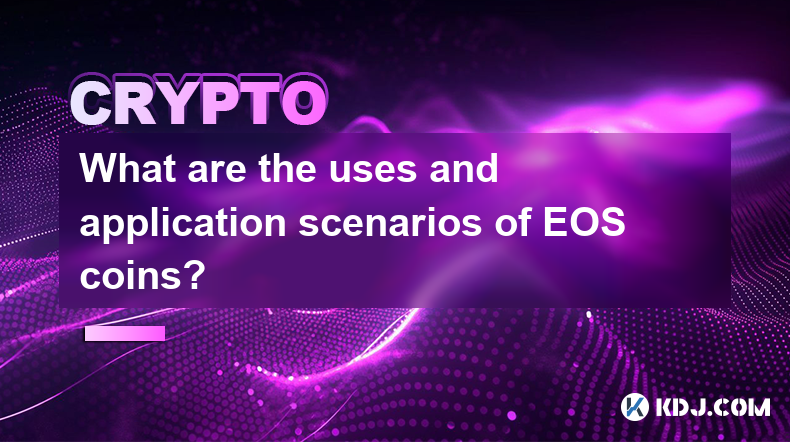
What are the uses and application scenarios of EOS coins?
Feb 26,2025 at 09:54pm
EOS: Decentralized Infrastructure for Scalable Blockchain ApplicationsKey Points:EOS enables the creation and deployment of decentralized applications with unparalleled scalability and efficiency.Its unique architecture features a high-throughput blockchain with zero transaction fees and the ability to process millions of transactions per second.EOS is ...
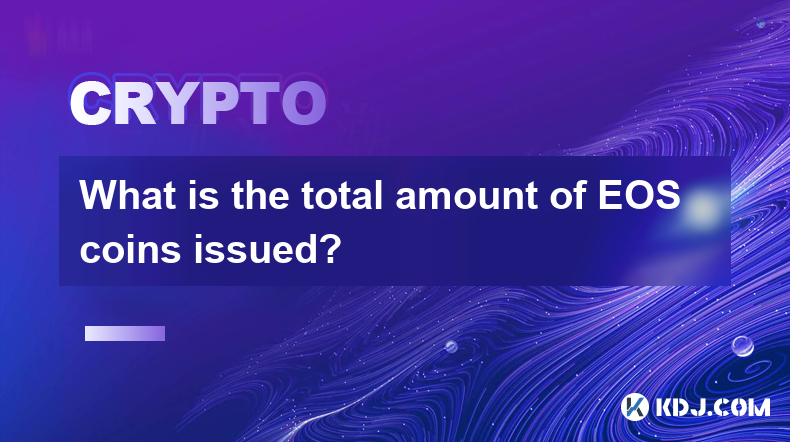
What is the total amount of EOS coins issued?
Feb 26,2025 at 06:24pm
Key PointsTotal Supply: Understand the concept of initial supply and its impact on EOS tokenomicsSupply Dynamics: Explore the various factors that affect EOS supply, including inflation and staking incentivesMarket Capitalization vs. Circulating Supply: Delve into the nuances between these metrics and their significance in token valuationDistribution an...
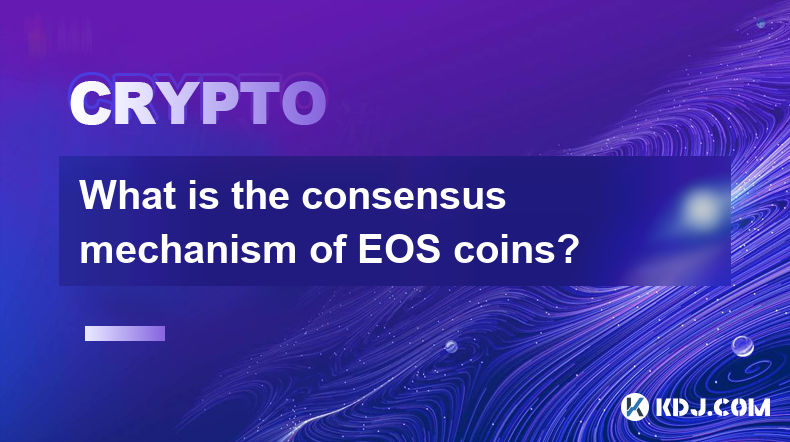
What is the consensus mechanism of EOS coins?
Feb 26,2025 at 11:19am
Key Points:EOSIO: The Foundation of EOS's Consensus MechanismDPOS: Delegated Proof-of-StakeBlock Producer ElectionsContinuous Block ProductionBlock Validation and IrreversibilityConsensus and Fork PreventionCommunity Governance and VotingWhat is the Consensus Mechanism of EOS Coins?EOS, an innovative blockchain platform, employs a unique consensus mecha...
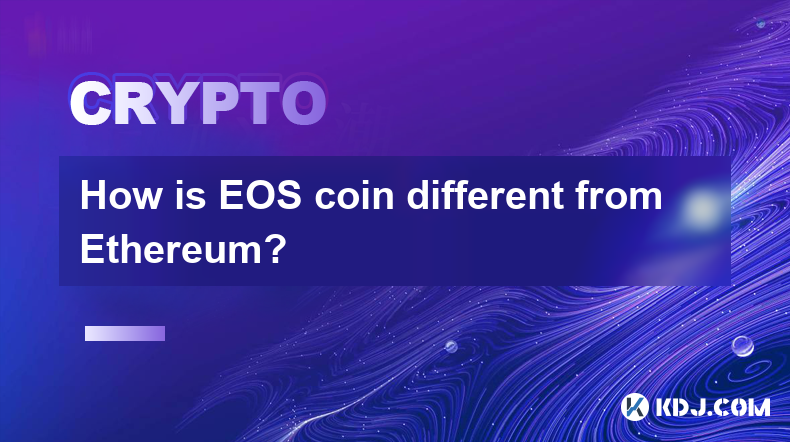
How is EOS coin different from Ethereum?
Feb 26,2025 at 10:48am
Key Points:Overview of EOS and EthereumDifferences in Consensus MechanismsAdvantages and Limitations of Each PlatformUse Cases and Target AudiencesComparison of Transaction Fees and ScalabilityCommunity Support and Development ActivityHow is EOS Coin Different from Ethereum?1. Overview of EOS and EthereumEOS and Ethereum are two of the most popular bloc...
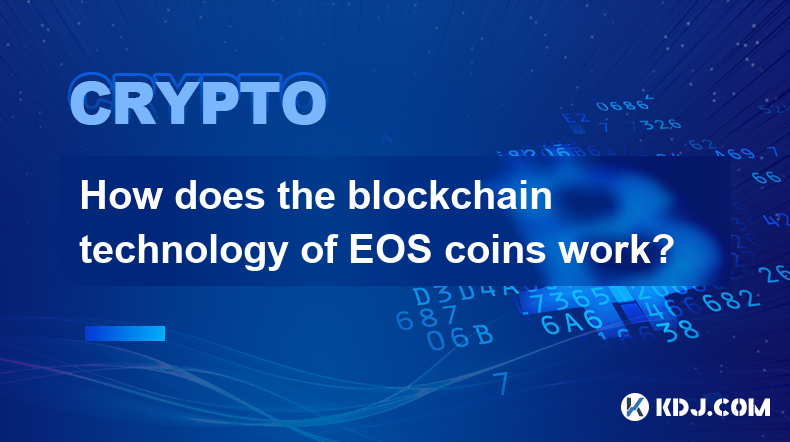
How does the blockchain technology of EOS coins work?
Feb 25,2025 at 11:13pm
Key PointsEOS is a blockchain platform that provides a high-throughput and scalable solution for decentralized applications.EOS uses a delegated proof-of-stake (DPoS) consensus mechanism to elect block producers and maintain the blockchain.EOSIO, the open-source software that powers EOS, offers a range of developer tools and features to facilitate the c...
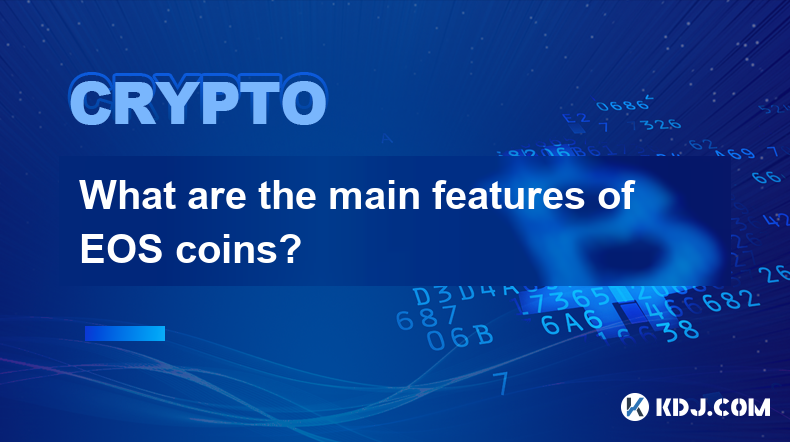
What are the main features of EOS coins?
Feb 27,2025 at 04:36pm
Key Points:EOS is a decentralized blockchain platform designed for building scalable and secure applications.EOS uses a unique consensus mechanism called Delegated Proof of Stake (DPoS), which improves transaction speed and efficiency.EOS has a robust ecosystem with a wide range of decentralized applications (dApps) and tools.EOS is known for its low tr...

What are the uses and application scenarios of EOS coins?
Feb 26,2025 at 09:54pm
EOS: Decentralized Infrastructure for Scalable Blockchain ApplicationsKey Points:EOS enables the creation and deployment of decentralized applications with unparalleled scalability and efficiency.Its unique architecture features a high-throughput blockchain with zero transaction fees and the ability to process millions of transactions per second.EOS is ...

What is the total amount of EOS coins issued?
Feb 26,2025 at 06:24pm
Key PointsTotal Supply: Understand the concept of initial supply and its impact on EOS tokenomicsSupply Dynamics: Explore the various factors that affect EOS supply, including inflation and staking incentivesMarket Capitalization vs. Circulating Supply: Delve into the nuances between these metrics and their significance in token valuationDistribution an...

What is the consensus mechanism of EOS coins?
Feb 26,2025 at 11:19am
Key Points:EOSIO: The Foundation of EOS's Consensus MechanismDPOS: Delegated Proof-of-StakeBlock Producer ElectionsContinuous Block ProductionBlock Validation and IrreversibilityConsensus and Fork PreventionCommunity Governance and VotingWhat is the Consensus Mechanism of EOS Coins?EOS, an innovative blockchain platform, employs a unique consensus mecha...

How is EOS coin different from Ethereum?
Feb 26,2025 at 10:48am
Key Points:Overview of EOS and EthereumDifferences in Consensus MechanismsAdvantages and Limitations of Each PlatformUse Cases and Target AudiencesComparison of Transaction Fees and ScalabilityCommunity Support and Development ActivityHow is EOS Coin Different from Ethereum?1. Overview of EOS and EthereumEOS and Ethereum are two of the most popular bloc...

How does the blockchain technology of EOS coins work?
Feb 25,2025 at 11:13pm
Key PointsEOS is a blockchain platform that provides a high-throughput and scalable solution for decentralized applications.EOS uses a delegated proof-of-stake (DPoS) consensus mechanism to elect block producers and maintain the blockchain.EOSIO, the open-source software that powers EOS, offers a range of developer tools and features to facilitate the c...

What are the main features of EOS coins?
Feb 27,2025 at 04:36pm
Key Points:EOS is a decentralized blockchain platform designed for building scalable and secure applications.EOS uses a unique consensus mechanism called Delegated Proof of Stake (DPoS), which improves transaction speed and efficiency.EOS has a robust ecosystem with a wide range of decentralized applications (dApps) and tools.EOS is known for its low tr...
See all articles

















































































